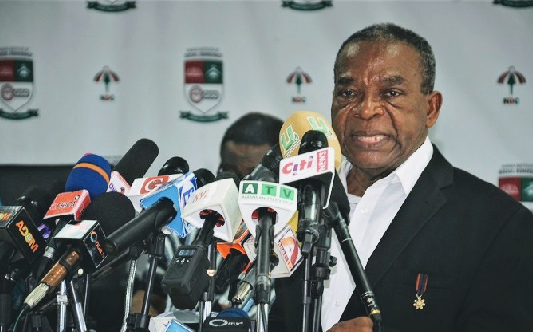
Reform proposals meant to trigger national discourse — NDC
The National Democratic Congress (NDC) has said its proposals for electoral reforms are intended to be used to undertake a dispassionate and open discussions towards a review of the electoral process.
“They are aimed at contributing to a national conversation on electoral reforms against the background of critical and lingering cross-party dissatisfaction with the electoral process,” Nana Ato Dadzie, the Chairman of a technical committee of the party that researched and drafted the reforms, said.
The reform proposals had been segregated into parts ‘A’ and ‘B’ with part ‘A’ requiring action by the Executive arm of the state while part ‘B’ contains reform proposals requiring action by the Electoral Commission (EC).
Speaking at a news conference in Accra today ( Tuesday), he asked the government to initiate the necessary steps to operationalise the party’s recommendations for electoral reforms ahead of the 2024 general election.
Giving details of the proposals, Nana Dadzie, a former Chief of Staff in the Rawlings administration and an elder of the party, said the part ‘A’ consisted of 10 recommendations of which the party considered three as its flagship recommendations.
Recommendations
The first of the three-flagship recommendations is that the members of the EC should be appointed by the President in consultation with the Council of State and with the prior approval of Parliament, provided that the Chairperson shall be approved by two-thirds of all the Members of Parliament.
“We draw attention to a similar independent institution of the Constitution, the Supreme Court, whose members are similarly appointed on the advice of the Judicial Council or in consultation with the Council of State as appropriate but in all cases with the prior approval of Parliament.
“We noted that the Constitutional Review Commission (CRC) of which Mrs. Jean Mensa, the current Chairperson of the EC was a member, made exactly the same recommendation in its report dated December 20, 2011 and the government white paper accepted the recommendation,” he said.
Nana Dadzie, who was flanked by other members of the technical committee, including Professor Kwamena Ahwoi, Mr. Kofi Attor and Mr. Alex Segbefia, said the second proposal was for the Inter-Party Advisory Committee (IPAC) to be backed by legislation and that its composition and functions be clearly spelt out in the legislation.
“We draw attention to a similar independent body in the Constitution, the Judiciary, whose Judicial Council also has its composition and functions spelt out both in the Constitution and in legislation,” he said.
Part B recommendation
The second part of the recommendations, (Part B) captured 24 reform proposals out of which the NDC considered nine as its flagship recommendations.
They included the implementation of the continuous registration of voters which had already been approved by IPAC and accepted by the EC.
Nana Dadzie mentioned the other proposals to include the abolishment of the Regional Collation Centres, maintaining the voting period of 7a.m to 5 p.m and allowing a public broadcast of the presidential vote collation process at the EC Head Office as and when the constituency presidential results are received and certified.
Not new
Nana Dadzie explained that the proposal of reforms was not a new development but rather a practice that had long existed.
“All previous ECs have been subjected to intense attack from the political parties over the period,” he said.
